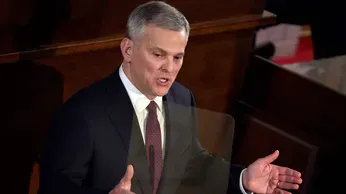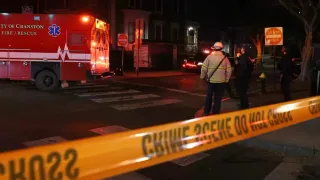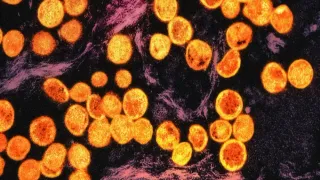
Jul 4
North Carolina Governor Vetoes Anti-DEI and Transgender Rights Bills, Calling Them 'Mean-Spirited'
Gary D. Robertson READ TIME: 3 MIN.
North Carolina Democratic Gov. Josh Stein vetoed on Thursday three anti-DEI bills and another measure that in part would target transgender rights. His actions set up more showdowns with Republican lawmakers who pitch the legislation as doing away with structured racial bias in government and public education, protecting women and empowering parents.
Stein criticized the Republican-controlled legislature for focusing on these measures while they've yet to enact a budget for the fiscal year that started this week. Instead, Stein said in a news release, it "wants to distract us by stoking culture wars that further divide us. These mean-spirited bills would marginalize vulnerable people and also undermine the quality of public services and public education."
The measures cutting or eliminating diversity, equity and inclusion initiatives in state and local governments, K-12 public schools and the university system have been a major priority for GOP lawmakers. They argue the programs targeted have overemphasized identity to the detriment of merit and societal unity.
The other vetoed bill initially ran as a bipartisan measure curbing sexual exploitation of women and minors by implementing age verification and consent requirements for people who appear on pornography websites. But the final measure was loaded with several contentious provisions. One would prevent state-funded gender transition procedures or gender-affirming hormone therapy for prisoners. It also affirms the recognition of two sexes and requires the state to officially attach a transgender person's new birth certificate to their old one if they change their sex assigned at birth.
The bills align with President Donald Trump's agenda to dismantle DEI practices and press against transgender rights. The legislation is now back at the General Assembly, which could return later this month to attempt veto overrides. Republicans are one House seat short of a veto-proof majority. No Democrats voted for the final three anti-DEI measures.
However, one House Democrat did vote for the other vetoed bill. By vetoing that measure, House Speaker Destin Hall said in a release, Stein "has sided with radical activists over the overwhelming majority of North Carolinians who believe in parental rights, biological reality, and protecting women and children." The bill also would order school districts to adopt policies so parents can ask that their child be excused from activities or readings that would "impose a substantial burden on the student's religious beliefs."
Stein said in a veto message that he strongly supported the anti-sexual exploitation provisions in the bill, but the final measure went too far. "My faith teaches me that we are all children of God no matter our differences and that it is wrong to target vulnerable people, as this bill does," he added.
As for the anti-DEI measures, one bill would ban training, staff positions and hiring decisions that incorporate DEI in state agencies. The legislation also would outlaw those agencies or local governments from using state funds for DEI programs. Workers who violate the law could face civil penalties. The two other bills would bar "divisive concepts" and "discriminatory practices" across public education statewide.
A Stein veto message said the bill addressing governments in part "is riddled with vague definitions yet imposes extreme penalties for unknowable violations." As for the education measures, Stein wrote, "we should not whitewash history" and "should ensure our students learn from diverse perspectives and form their own opinions."
But Senate leader Phil Berger said on the social platform X the governor is "choosing to ignore the clear will of the people who are tired of politically correct nonsense" by refusing to end DEI programs.
Stein has now vetoed 11 measures since taking office in January – all of them in the past two weeks.
Of the eight bills Stein signed Thursday, one will block certain abuse and neglect charges for parents or caregivers raising transgender children "consistent with the juvenile's biological sex." The bill also says that adoption agencies can't be permitted to deny someone from adopting a child because of their unwillingness to allow the child to transition.
Bill sponsors said the provisions were needed to allow parents and guardians to raise children in line with their family values. But opponents said the measure would harm transgender children and intrude in family matters governed by other laws. Nine House Democrats voted for the final bill.
Asked why Stein signed the bill, spokesperson Kate Frauenfelder said, "Parents have the right to raise their kids how they think is best for them, but of course, child abuse will never be tolerated." Stein remains confident that health and social services offices "will continue to find the best placements for kids," she added.






